25 apr 2019
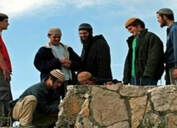
Several fanatic illegal Israeli colonists poisoned, Thursday, a Palestinian water well east of Yatta town, south of Hebron, in the southern part of the occupied West Bank.
Rateb Jabour, the coordinator of the National and Popular Committees against the Annexation Wall and Colonies in southern West Bank, said the assailants came from the illegal Ma’on colonialist outpost, which was built on private Palestinian lands, east of Yatta town.
Jabour added that the colonists dumped blue liquid toxins in the well in the al-Hamra area in the at-Tiwani, near the outpost, and stated that the well was used by local shepherds to provide water for their flock.
The attack is the latest in a serious of assaults and violations targeting the Palestinians, especially the shepherds and farmers, to force them out of their lands so that the colonists can expand their illegal outposts.
Rateb Jabour, the coordinator of the National and Popular Committees against the Annexation Wall and Colonies in southern West Bank, said the assailants came from the illegal Ma’on colonialist outpost, which was built on private Palestinian lands, east of Yatta town.
Jabour added that the colonists dumped blue liquid toxins in the well in the al-Hamra area in the at-Tiwani, near the outpost, and stated that the well was used by local shepherds to provide water for their flock.
The attack is the latest in a serious of assaults and violations targeting the Palestinians, especially the shepherds and farmers, to force them out of their lands so that the colonists can expand their illegal outposts.
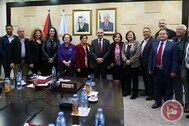
The Palestinian Prime Minister Muhammad Ishtayeh received a delegation of the American Federation of Ramallah, Palestine, in his office in the central occupied West Bank city of Ramallah.
The PM updated the delegation on activities that would support the steadfastness of Palestinians in the health and education sectors.
Ishtayeh wished Palestinians a happy Easter, hoping that next year Palestinians would be celebrating in Jerusalem as the capital of the Palestinian state.
He called upon the federation to visit and invest in Palestine in support of the people.
Ishtayeh praised the federation’s role in supporting the health sector in Palestine, especially by bringing in Palestinian doctors to serve Palestinian hospitals, and building six new hospitals in the West Bank.
The PM updated the delegation on activities that would support the steadfastness of Palestinians in the health and education sectors.
Ishtayeh wished Palestinians a happy Easter, hoping that next year Palestinians would be celebrating in Jerusalem as the capital of the Palestinian state.
He called upon the federation to visit and invest in Palestine in support of the people.
Ishtayeh praised the federation’s role in supporting the health sector in Palestine, especially by bringing in Palestinian doctors to serve Palestinian hospitals, and building six new hospitals in the West Bank.
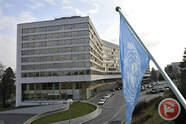
In a newly published report, the United Nations noted that the scope of the challenges facing the Palestinian people and government is unprecedented. A major fiscal crisis, coupled with growing humanitarian needs, and the lack of a political prospect for a negotiated solution, threatens the stability of the West Bank and the very survival of the Palestinian state-building effort, according to a press release issued on Thursday.
The report, which was issued by the office of the United Nations Special Coordinator for the Middle East Peace Process (UNSCO) for the upcoming bi-annual meeting of the Ad Hoc Liaison Committee (AHLC) in Brussels on April 30th, warned of the unprecedented financial, security, and political challenges faced by the Palestinian Authority (PA).
The UN report detailed the backdrop, which includes continued Israeli military occupation, settlement expansion and demolitions, territorial fragmentation, lack of jurisdiction, increased Palestinian protection needs, violence between Palestinians and the Israeli Security Forces and dwindling financial support.
Of particular concern, is the financial crisis caused by Israel’s decision to partially withhold six percent of the clearance revenue it collects on behalf of the PA and the subsequent Palestinian decision not to accept any such revenue unless the full amount it is owed is transferred. As a result of these decisions, the Palestinian Government has been deprived of some 65% of its revenue and forced to take extreme austerity measures.
The report also warned that unless resolved, the impact of this crisis will take years to undo and reiterated the UN Secretary-General’s call to both sides to engage in a constructive manner with the goal of restoring the revenue transfers in full, in line with the Paris Protocol on Economic Relations.
It stressed the United Nations’ firm commitment to continue working with Israel, the Palestinian Authority and the international community to find a solution to the unprecedented fiscal crisis as a matter of urgency.
The report outlined a number of steps taken by the UN to facilitate the implementation of critical humanitarian and economic interventions in Gaza, which were supported by the AHLC in September 2018.
These achievements include a more than doubling of the electricity supply to the Gaza Strip since October 2018, the creation of thousands of temporary jobs, and the provision of emergency medical supplies. It further detailed continuing efforts to find sustainable solutions for the energy, water and health sectors.
The United Nations Special Coordinator for the Middle East Peace Process, Nickolay Mladenov, said, “Addressing the deteriorating humanitarian and economic situation in Gaza requires not only donor funding and project implementation, but bold policy decisions by all sides.”
Mladenov added, “The continued Israeli closures on Gaza, coupled with internal Palestinian division and more than a decade of Hamas rule in Gaza, has resulted in the breakdown of governance in the Gaza Strip and increased the risk of war.”
The AHLC, chaired by Norway and co-sponsored by the European Union (EU) and the United States with the participation of the UN together with the World Bank and the International Monetary Fund (IMF), serves as the principal policy-level coordination mechanism for development assistance to the occupied Palestinian territory and seeks to promote dialogue between donors, the PA and the Israeli government.
The report, which was issued by the office of the United Nations Special Coordinator for the Middle East Peace Process (UNSCO) for the upcoming bi-annual meeting of the Ad Hoc Liaison Committee (AHLC) in Brussels on April 30th, warned of the unprecedented financial, security, and political challenges faced by the Palestinian Authority (PA).
The UN report detailed the backdrop, which includes continued Israeli military occupation, settlement expansion and demolitions, territorial fragmentation, lack of jurisdiction, increased Palestinian protection needs, violence between Palestinians and the Israeli Security Forces and dwindling financial support.
Of particular concern, is the financial crisis caused by Israel’s decision to partially withhold six percent of the clearance revenue it collects on behalf of the PA and the subsequent Palestinian decision not to accept any such revenue unless the full amount it is owed is transferred. As a result of these decisions, the Palestinian Government has been deprived of some 65% of its revenue and forced to take extreme austerity measures.
The report also warned that unless resolved, the impact of this crisis will take years to undo and reiterated the UN Secretary-General’s call to both sides to engage in a constructive manner with the goal of restoring the revenue transfers in full, in line with the Paris Protocol on Economic Relations.
It stressed the United Nations’ firm commitment to continue working with Israel, the Palestinian Authority and the international community to find a solution to the unprecedented fiscal crisis as a matter of urgency.
The report outlined a number of steps taken by the UN to facilitate the implementation of critical humanitarian and economic interventions in Gaza, which were supported by the AHLC in September 2018.
These achievements include a more than doubling of the electricity supply to the Gaza Strip since October 2018, the creation of thousands of temporary jobs, and the provision of emergency medical supplies. It further detailed continuing efforts to find sustainable solutions for the energy, water and health sectors.
The United Nations Special Coordinator for the Middle East Peace Process, Nickolay Mladenov, said, “Addressing the deteriorating humanitarian and economic situation in Gaza requires not only donor funding and project implementation, but bold policy decisions by all sides.”
Mladenov added, “The continued Israeli closures on Gaza, coupled with internal Palestinian division and more than a decade of Hamas rule in Gaza, has resulted in the breakdown of governance in the Gaza Strip and increased the risk of war.”
The AHLC, chaired by Norway and co-sponsored by the European Union (EU) and the United States with the participation of the UN together with the World Bank and the International Monetary Fund (IMF), serves as the principal policy-level coordination mechanism for development assistance to the occupied Palestinian territory and seeks to promote dialogue between donors, the PA and the Israeli government.
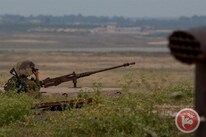
Israeli forces opened fire targeting Palestinian farmers in the southern besieged Gaza Strip, on Thursday morning.
Witnesses told Ma'an that Israeli forces deployed in military watchtowers at the Sufa military site in southeastern Gaza Strip opened fire at Palestinian farmers working in their lands in the area.
No injuries were reported.
The Israeli army also regularly detains and opens fire on unarmed Palestinian fishermen, shepherds, and farmers along the border areas if they approach the buffer zone, as the authorities have not made clear the precise area of the designated zone.
The practice has in effect destroyed much of the agricultural and fishing sector of the blockaded coastal enclave, which has been under an Israeli air, land, and sea blockade for 10 years.
Witnesses told Ma'an that Israeli forces deployed in military watchtowers at the Sufa military site in southeastern Gaza Strip opened fire at Palestinian farmers working in their lands in the area.
No injuries were reported.
The Israeli army also regularly detains and opens fire on unarmed Palestinian fishermen, shepherds, and farmers along the border areas if they approach the buffer zone, as the authorities have not made clear the precise area of the designated zone.
The practice has in effect destroyed much of the agricultural and fishing sector of the blockaded coastal enclave, which has been under an Israeli air, land, and sea blockade for 10 years.
22 apr 2019
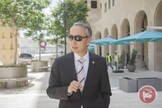
Takeshi Okubo, Ambassador for the Palestinian Affairs and Representative of Japan to Palestine, visited Beit Duqqu village northeast of the central occupied West Bank district of Jerusalem, to celebrate the completion of the project funded by the Government of Japan through Japan’s Grant Assistance for Grassroots Human Security Projects (GGP).
According to a press release, on Sunday, Palestinian Farmers used a grant of $87,500 to replace the old compost production machines and reconstruct the current compost production plant of Beit al-Karma Farmers Union (BFU) in Beit Duqqu.
This project aims at increasing the compost production of BFU from 600,000 liters to 2,225,000 litters to stably provide cheaper compost to the farmers in Beit Duqqo and its surroundings. About 360 households benefit from the project.
During his speech, Okubo emphasized Japan’s firm commitment of supporting Palestinian people from human security perspective as well as the importance of implementing social and economic development projects needed for Palestinian communities.
Since 1993 the Government of Japan has extended its official development assistance, to the Palestinians to approximately $1.86 billion.
GGP projects have been formulated in collaboration with the Palestinian Authority through Ministry of Finance and Planning since 2010.
According to a press release, on Sunday, Palestinian Farmers used a grant of $87,500 to replace the old compost production machines and reconstruct the current compost production plant of Beit al-Karma Farmers Union (BFU) in Beit Duqqu.
This project aims at increasing the compost production of BFU from 600,000 liters to 2,225,000 litters to stably provide cheaper compost to the farmers in Beit Duqqo and its surroundings. About 360 households benefit from the project.
During his speech, Okubo emphasized Japan’s firm commitment of supporting Palestinian people from human security perspective as well as the importance of implementing social and economic development projects needed for Palestinian communities.
Since 1993 the Government of Japan has extended its official development assistance, to the Palestinians to approximately $1.86 billion.
GGP projects have been formulated in collaboration with the Palestinian Authority through Ministry of Finance and Planning since 2010.
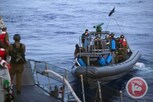
Israeli forces opened fire targeting Palestinian farmers and fishermen across the besieged Gaza Strip, on Monday morning.
Israeli forces deployed in military watchtowers at the Sufa military site between the Rafah and Khan Younis districts, in the southern Gaza Strip, opened fire at Palestinian farmers working in the area.
Additionally, Israeli forces also opened fire towards nearby Palestinian agricultural lands.
Meanwhile, Israeli naval boats opened fire targeting Palestinian fishermen off the coast of Rafah City, forcing them to head back to shore in fear for their lives.
No injuries were reported.
The Israeli army also regularly detains and opens fire on unarmed Palestinian fishermen, shepherds, and farmers along the border areas if they approach the buffer zone, as the authorities have not made clear the precise area of the designated zone.
The practice has in effect destroyed much of the agricultural and fishing sector of the blockaded coastal enclave, which has been under an Israeli air, land, and sea blockade for 10 years.
Israeli forces deployed in military watchtowers at the Sufa military site between the Rafah and Khan Younis districts, in the southern Gaza Strip, opened fire at Palestinian farmers working in the area.
Additionally, Israeli forces also opened fire towards nearby Palestinian agricultural lands.
Meanwhile, Israeli naval boats opened fire targeting Palestinian fishermen off the coast of Rafah City, forcing them to head back to shore in fear for their lives.
No injuries were reported.
The Israeli army also regularly detains and opens fire on unarmed Palestinian fishermen, shepherds, and farmers along the border areas if they approach the buffer zone, as the authorities have not made clear the precise area of the designated zone.
The practice has in effect destroyed much of the agricultural and fishing sector of the blockaded coastal enclave, which has been under an Israeli air, land, and sea blockade for 10 years.
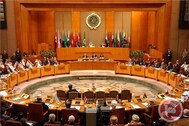
The Arab League Council pledged $100 million per month to the Palestinian Authority (PA) to make up for tax revenues withheld by Israel, which is the amount paid as stipends to the families of Palestinians killed or imprisoned by Israel.
Palestinian President Mahmoud Abbas addressed the Arab League Council in the Egyptian capital of Cairo, on Sunday, as part of a diplomatic effort to rebuff the United States Trump administration's Middle East peace plan, which US officials indicate could be released this summer.
Abbas said, "The Arabs need to be engaging actively at this critical time."
In a statement issued at the end of the session held in Cairo, the Arab ministers pledged to implement the decision of the Tunis summit to activate a financial safety network of $100 million per month to meet the political and financial pressures facing the Palestinian government.
The council stressed that the Arab countries which endorsed the Arab peace initiative of 2002 to be achieved in accordance with international law and legitimacy and based on the principle of 'land for peace,’ cannot accept any plan or deal that does not go in line with these international references.
The council also said that “such a deal would not succeed in achieving lasting and comprehensive peace in the Middle East if it did not guarantee the legitimate rights of the Palestinian people, first and foremost their right to self-determination and the establishment of an independent and sovereign state on 1967 borders with East Jerusalem as its capital.”
In mid-February, Israel's security cabinet approved the deduction of $138 million from the tax revenues it collects on behalf of the PA under the Oslo agreement.
The deduction is deemed to be relative to the said amount that the PA allocates for stipends paid to Palestinian prisoners in Israeli custody, as well as the families of the prisoners.
It is noteworthy that Israel collects funds from imports into the West Bank and Gaza, in addition to other taxes, and forwards a large sum of it to the PA, after deduction of payments for water and electricity.
Palestinian President Mahmoud Abbas addressed the Arab League Council in the Egyptian capital of Cairo, on Sunday, as part of a diplomatic effort to rebuff the United States Trump administration's Middle East peace plan, which US officials indicate could be released this summer.
Abbas said, "The Arabs need to be engaging actively at this critical time."
In a statement issued at the end of the session held in Cairo, the Arab ministers pledged to implement the decision of the Tunis summit to activate a financial safety network of $100 million per month to meet the political and financial pressures facing the Palestinian government.
The council stressed that the Arab countries which endorsed the Arab peace initiative of 2002 to be achieved in accordance with international law and legitimacy and based on the principle of 'land for peace,’ cannot accept any plan or deal that does not go in line with these international references.
The council also said that “such a deal would not succeed in achieving lasting and comprehensive peace in the Middle East if it did not guarantee the legitimate rights of the Palestinian people, first and foremost their right to self-determination and the establishment of an independent and sovereign state on 1967 borders with East Jerusalem as its capital.”
In mid-February, Israel's security cabinet approved the deduction of $138 million from the tax revenues it collects on behalf of the PA under the Oslo agreement.
The deduction is deemed to be relative to the said amount that the PA allocates for stipends paid to Palestinian prisoners in Israeli custody, as well as the families of the prisoners.
It is noteworthy that Israel collects funds from imports into the West Bank and Gaza, in addition to other taxes, and forwards a large sum of it to the PA, after deduction of payments for water and electricity.
21 apr 2019

Palestinian exports increased by 10% in February compared to January 2019, while it decreased by 13% compared to February 2018 and reached $83.7 million, according to the Palestinian Central Bureau of Statistics (PCBS).
PCBS said that exports to Israel increased in February by 2% compared to January and represented 89% of total exports in the same month.
On the other hand, exports to other countries decreased by 2% during the same period compared to January.
In addition, imports decreased in February by 9% compared to January 2019, while it increased by 6% compared to February 2018 and reached $459.8 million.
PCBS added that imports from Israel decreased by 3% in February compared to January and represented 59% of total imports in the same month. At the same time, imports from other countries decreased by 15% compared to January.
PCBS said that exports to Israel increased in February by 2% compared to January and represented 89% of total exports in the same month.
On the other hand, exports to other countries decreased by 2% during the same period compared to January.
In addition, imports decreased in February by 9% compared to January 2019, while it increased by 6% compared to February 2018 and reached $459.8 million.
PCBS added that imports from Israel decreased by 3% in February compared to January and represented 59% of total imports in the same month. At the same time, imports from other countries decreased by 15% compared to January.
19 apr 2019
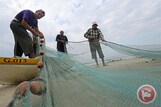
Israeli naval forces opened fire at Palestinian fishing boats off the coast of the southern besieged Gaza Strip, on Friday morning.
Witnesses told Ma'an that Israeli naval boats opened fire at Palestinian fishermen off the coast of Khan Younis and Rafah cities in the southern Gaza Strip several times before started to chase fishing boats.
Fishermen were forces to head back to shore.
No injuries were reported.
The Israeli army also regularly detains and opens fire on unarmed Palestinian fishermen, shepherds, and farmers along the border areas if they approach the buffer zone, as the authorities have not made clear the precise area of the designated zone.
The practice has in effect destroyed much of the agricultural and fishing sector of the blockaded coastal enclave, which has been under an Israeli air, land, and sea blockade for 10 years.
Witnesses told Ma'an that Israeli naval boats opened fire at Palestinian fishermen off the coast of Khan Younis and Rafah cities in the southern Gaza Strip several times before started to chase fishing boats.
Fishermen were forces to head back to shore.
No injuries were reported.
The Israeli army also regularly detains and opens fire on unarmed Palestinian fishermen, shepherds, and farmers along the border areas if they approach the buffer zone, as the authorities have not made clear the precise area of the designated zone.
The practice has in effect destroyed much of the agricultural and fishing sector of the blockaded coastal enclave, which has been under an Israeli air, land, and sea blockade for 10 years.
18 apr 2019
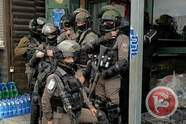
Israeli forces escorted Israeli municipality staff raiding the surroundings of the Qalandiya refugee camp north of occupied East Jerusalem, on Thursday afternoon.
Israeli forces and municipality staff raided stores and removed vendor carts close to the street.
The Israeli police issued tickets against drivers of vehicles holding Israeli plates, and stores for tax-related reasons.
Israeli forces were heavily deployed around the military checkpoint separating Jerusalem City from the refugee camp.
Clashes erupted between locals and Israeli soldiers, during which soldiers fired live bullets, rubber-coated steel bullets and tear-gas bombs.
Israeli forces and municipality staff raided stores and removed vendor carts close to the street.
The Israeli police issued tickets against drivers of vehicles holding Israeli plates, and stores for tax-related reasons.
Israeli forces were heavily deployed around the military checkpoint separating Jerusalem City from the refugee camp.
Clashes erupted between locals and Israeli soldiers, during which soldiers fired live bullets, rubber-coated steel bullets and tear-gas bombs.
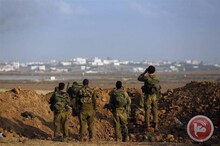
Israeli forces opened fire targeting Palestinian farmers and fishermen across the besieged Gaza Strip, on Thursday.
Witnesses told a Ma'an reporter that Israeli forces deployed in military watchtowers opened fire at farmers working in their lands in the Khuzaa town in the Khan Younis district in the southern Gaza Strip.
Meanwhile, Israeli war boats opened fire targeting Palestinian fishermen off the coast of the northern and southern Gaza Strip.
No injuries were reported.
The Israeli army also regularly detains and opens fire on unarmed Palestinian fishermen, shepherds, and farmers along the border areas if they approach the buffer zone, as the authorities have not made clear the precise area of the designated zone.
The practice has in effect destroyed much of the agricultural and fishing sector of the blockaded coastal enclave, which has been under an Israeli air, land, and sea blockade for 10 years.
Witnesses told a Ma'an reporter that Israeli forces deployed in military watchtowers opened fire at farmers working in their lands in the Khuzaa town in the Khan Younis district in the southern Gaza Strip.
Meanwhile, Israeli war boats opened fire targeting Palestinian fishermen off the coast of the northern and southern Gaza Strip.
No injuries were reported.
The Israeli army also regularly detains and opens fire on unarmed Palestinian fishermen, shepherds, and farmers along the border areas if they approach the buffer zone, as the authorities have not made clear the precise area of the designated zone.
The practice has in effect destroyed much of the agricultural and fishing sector of the blockaded coastal enclave, which has been under an Israeli air, land, and sea blockade for 10 years.
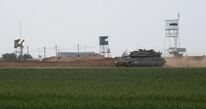
The Israeli occupation forces (IOF) on Thursday morning opened fire, with no reason, at Palestinian farmers during their presence on their lands in the east of Khan Younis city in southern Gaza.
According to media sources, soldiers opened machinegun fire from border watchtowers near the Abu Raida Gate in the east of Khuza’a, with no reported casualties.
The gunfire attack caused panic among the farmers and forced some of them to leave their plots of land.
According to media sources, soldiers opened machinegun fire from border watchtowers near the Abu Raida Gate in the east of Khuza’a, with no reported casualties.
The gunfire attack caused panic among the farmers and forced some of them to leave their plots of land.
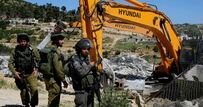
The Israeli occupation army on Wednesday demolished three agricultural rooms belonging to Palestinian farmers in al-Khader town, south of Bethlehem.
Local official Hasan Berejiya said that one Israeli bulldozer escorted by soldiers stormed Shawshahla area in al-Khader town and embarked on knocking down three agricultural rooms at the pretext of unlicensed construction.
The razed structures belonged to farmers Munder Salah, Sa’ad Salah and Habbas Salah.
Recently, the Israeli army closed a main road leading to Shawshahla area and prevented homeowners from entering it for several hours a day.
Local official Hasan Berejiya said that one Israeli bulldozer escorted by soldiers stormed Shawshahla area in al-Khader town and embarked on knocking down three agricultural rooms at the pretext of unlicensed construction.
The razed structures belonged to farmers Munder Salah, Sa’ad Salah and Habbas Salah.
Recently, the Israeli army closed a main road leading to Shawshahla area and prevented homeowners from entering it for several hours a day.
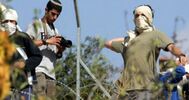
A horde of Jewish settlers on Wednesday attacked Palestinian farmers as they were working their land in the southeast of Nablus.
According to local sources, the settlers assaulted and brutalized several Palestinian farmers as they were cultivating their lands inside the illegal settlement of Eli, which was established on lands annexed from Qaryut village in Nablus.
Local activist Bashar al-Qaryuti said that dozens of farmers went to their lands that are located within the boundaries of Eli settlement after obtaining access permits from the Israeli occupation authority (IOA).
Qaryuti affirmed that Israeli soldiers provided protection for the settlers during their assault on the farmers and detained 25 farmers until police officers arrived and took their statements.
He pointed out that the IOA allows the local farmers to reach their lands inside the settlement twice a year, warning of Israeli intents to annex these agricultural lands to build more housing units for settlers.
According to local sources, the settlers assaulted and brutalized several Palestinian farmers as they were cultivating their lands inside the illegal settlement of Eli, which was established on lands annexed from Qaryut village in Nablus.
Local activist Bashar al-Qaryuti said that dozens of farmers went to their lands that are located within the boundaries of Eli settlement after obtaining access permits from the Israeli occupation authority (IOA).
Qaryuti affirmed that Israeli soldiers provided protection for the settlers during their assault on the farmers and detained 25 farmers until police officers arrived and took their statements.
He pointed out that the IOA allows the local farmers to reach their lands inside the settlement twice a year, warning of Israeli intents to annex these agricultural lands to build more housing units for settlers.
